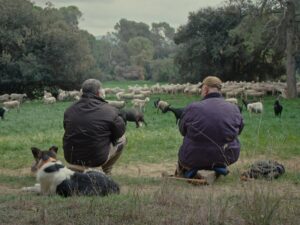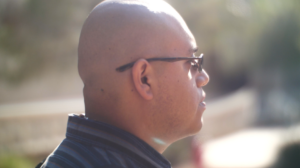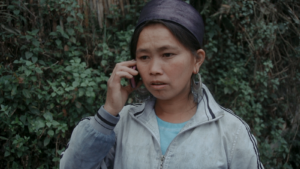Film Update: Eat Your Catfish
POV’s Digital Curator Anthony Yooshin Kim caught up with Eat Your Catfish filmmakers Adam Isenberg, Senem Tüzen, and Noah Amir Arjomand to provide a window into the making of their film and reflect on the journey since the cameras stopped rolling.
In Eat Your Catfish, viewers are drawn into Kathryn’s world — a woman paralyzed by late-stage ALS. Her narrative unfolds with a mordant wit and fervent desire to witness her daughter’s wedding, all seen through the lens of her own perspective. The filmmakers and producers behind this documentary are Adam Isenberg, Senem Tüzen, and Noah Amir Arjomand — Kathryn’s very own son. Collectively, they construct a candid and comically grim portrayal of a family poised on the edge, grappling with the immense complexities of disability and in-home caregiving.
Making its world premiere in at IDFA in the Envision Competition in 2021, Eat Your Catfish quickly generated attention and acclaim and was nominated for Best Documentary. In 2022, the accolades poured in: Best Documentary at the Istanbul International Film Festival, Best International Documentary at the Antenna Documentary Festival, and numerous nominations at renowned festivals such as the Santa Barbara International Film Festival, Full Frame Documentary Film Festival, and Turkish Film Critics Association (SIYAD) Awards. The documentary’s prowess was further underscored with a nomination for the Youth Jury Award at the 2022 Sheffield International Documentary Festival.
Arjomand’s connection with the story began in 2013, originating from a challenging phase in his life. Following an apartment fire, he relocated to his parents’ home and became a primary caregiver for his mother. This personal encounter with the challenges and intricacies of caregiving for someone with ALS sowed the seeds for Eat Your Catfish. Arjomand confided, “I was part of a story that might be both cathartic to people going through similar struggles and eye-opening to anyone… with little idea of what family life is like in the context of a challenge like ALS.”
This realization germinated into a collaborative partnership with Isenberg and Tüzen, despite their geographical distance spanning Spain and Turkey. The trio’s choice of a measured and deliberate observational methodology posed its own set of challenges, resulting in an eight-year journey. “Our method of indiscriminately filming as much of my family’s life as possible put a huge burden on the post-production editing process,” Arjomand stated. Echoing these sentiments, Isenberg detailed the complexity of editing over 930 hours of footage, comparing it “trying to write a novel when you have a room full of scraps of paper and each paper’s got a sentence.” However, Arjomand credits this approach with the realism the film achieved although he playfully quipped, “I probably won’t try to make another film that way!”
The filmmaking style of Eat Your Catfish is shaped by an eclectic array of influences that aimed to chronicle the unfiltered day-to-day experiences of the Arjomand family while allowing for individual interpretations to flourish. Tüzen notes the inspiration of Victor Kossakovsky and Robert Bresson, while Isenberg highlights his affinity for cinéma-vérité documentaries, particularly those by the Maysles brothers and Nicolas Philibert. Arjomand’s muse encompasses anthropologists Margaret Mead and Gregory Bateson, who ventured into film experimentation during the 1930s, with a focus on Mead’s approach to confronting personal biases. The work of Lucien Castaing-Taylor and Harvard’s Sensory Ethnography Lab, known for capturing life from unique perspectives, also influenced the documentary’s approach.
Central to the documentary’s brilliance is its unflinching representation of the unraveling of a nuclear family. Tüzen perceptively notes how conventional narratives of disability and illness often follow a male protagonist, who, with the unwavering support of a devoted spouse, emerges triumphant by the story’s end. In the case of Eat Your Catfish, this narrative mold is eschewed. Tüzen eloquently observes, “the departure from conventional gender roles redefines the caregiving narrative, where one protagonist’s journey unfolds as a triumphant saga while the other ventures into the realm of dark comedy.” This divergence not only defies stereotypes but also delves into the intricate web of familial dynamics and the complexities of caregiving experiences.
The documentary concludes with Kathryn’s passing in 2017. She had a chance to view a rough-cut during her final days, and Arjomand fondly remembered her reaction: “It was one of the few times that week that she smiled and laughed.”
Post-production, Arjomand’s family underwent significant changes. His sister moved to Texas, expanding her family with two children, while his father returned to Iran, remarried, and attended the film’s festival premiere in Amsterdam. He expressed appreciation for the film’s portrayal of his late wife’s humor.
The documentary’s international reach has sparked connections and conversations. One memorable encounter took place at a film festival in Budapest. After a screening, an attendee shared that his own mother had died from ALS just a few days prior. He ended up having a long conversation with Isenberg and Arjomand about the inadequacies of medical systems and patient care between Hungary and the United States. To this end, Arjomand sincerely hopes the film “will be a useful resource for other medical and psychological professionals, educators, and researchers for the close look it offers of in-home caretaking and life with ALS.”
In the aftermath of Eat Your Catfish, the filmmakers have all embarked on new paths.
Having published Fixing Stories: Local Newsmaking and International Media in Turkey and Syria — a culmination of his research on Middle Eastern journalism — Arjomand is now busy exploring the world of arts. He’s pursuing an MFA in creative writing at the University of California, Riverside, writing scripts based on topics of journalism and propaganda, collaborating on a musical series called Anchored, and writing a novel called The Death of Art about cults, finance, and the contemporary art world.
As for Isenberg, he is “developing and currently seeking partners for a documentary series about everyday families in all their varied structures, and what it even means to be a family.” Tüzen is now channeling her energies into a film that encapsulates her “experiences, feelings, and impressions while navigating life in a touristic European city as a female immigrant and mother of young children, coming from a Muslim cultural background.”
The intimate narrative crafted by the filmmakers stands as a powerful testament to the transformative nature of art and the indelible human exchanges it can foster. Tüzen aptly encapsulates the essence of the documentary’s impact, saying, “It’s nice to hear that people in different parts of the world can relate to our film. It reminds us that we’re all dealing with similar issues in different ways.” Isenberg adds, “Film is a very powerful tool that can really touch people. It’s amazing how it can spark conversations and understanding.”
Finally, Arjomand expresses, “I hope that watching the film leads people not familiar with ALS and similar conditions to empathetically consider the state of being trapped in an immobile body with an active mind. I also hope that anyone involved in a caretaking relationship will find the film helpful for processing their own experiences through comparison.”
Eat Your Catfish premiered on Monday, July 24th and is available to stream through October 22nd.
 Film Review: Fauna
Film Review: Fauna  Film Update: unseen
Film Update: unseen  Film Update: Fire Through Dry Grass
Film Update: Fire Through Dry Grass  Film Update: Murders That Matter
Film Update: Murders That Matter  Film Update: While We Watched
Film Update: While We Watched  Film Update: Uýra: The Rising Forest
Film Update: Uýra: The Rising Forest  Film Update: Children of the Mist
Film Update: Children of the Mist